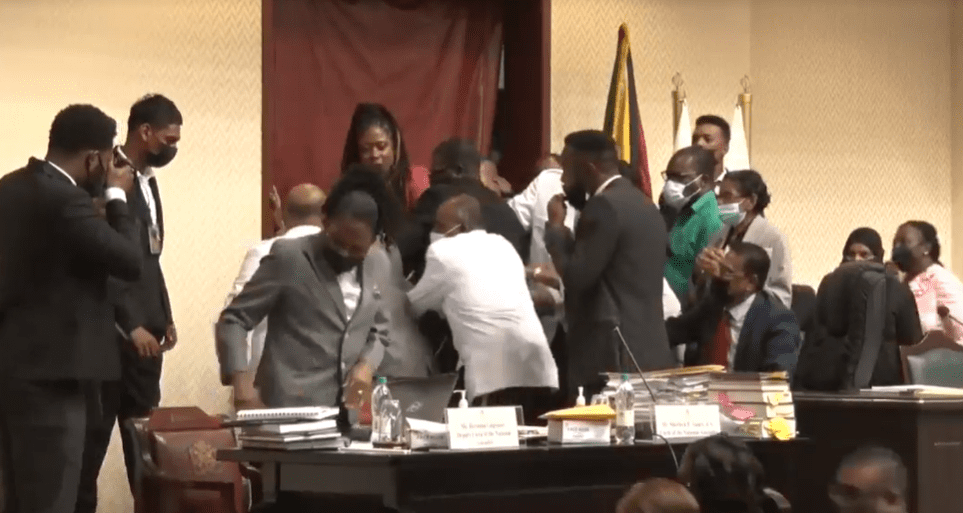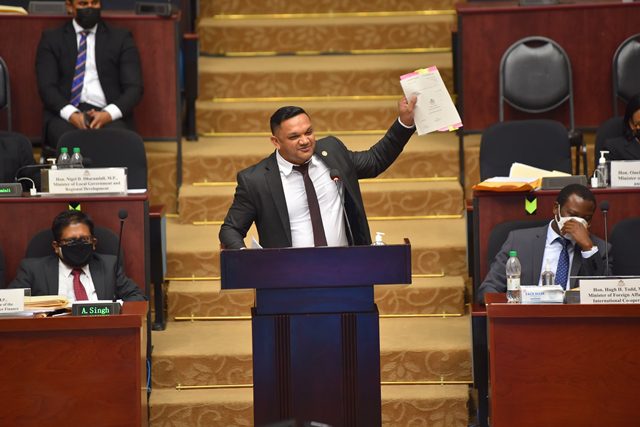Guyana on Wednesday passed major bills in Parliament, soon to be signed into law, that would advance the country’s framework for managing the rapidly expanding oil and gas sector which is set to rake in billions of U.S. dollars for the nation of just over 750,000 people.
Local Content
The landmark Local Content Bill 21 of 2021 was passed paving the way for local companies and citizens to participate in no less than 40 critical areas in the oil sector which government and a number of private sector stakeholders say will ensure international oil companies and their contractors utilize more local services and products.
Minister of Natural Resources, Vickram Bharrat said the burning question from Guyanese across the country has been how they can benefit from the oil and gas sector. He said it was therefore government’s hope that the local content bill would be passed and supported by both sides of the House. However, while the opposition said they supported local content legislation in principle, they abstained from voting on the passage of the bill, after insisting that it is sent to the Parliamentary Sectoral Committee on Natural Resources for further review.
Nevertheless, the government, with its majority, passed the landmark legislation following five hours of debate.
Mr. Bharrat said since oil was discovered in 2015 under the then APNU+AFC administration, nothing was done to advance a local content framework which resulted in Guyanese losing out on major opportunities in the oil and gas sector. As such, the official said there was no time and no need for further delays, pointing out that his party, the PPP/C, was voted into office last year precisely because the Guyanese people wanted better management of the petroleum sector.
Natural Resource Fund
The government also moved forward with the passage of the Natural Resource Fund (NRF) bill, paving the way for incoming revenues from oil exports to be allocated for major national development initiatives. Not a cent has yet been spent so far from the more than US$500 million dollars in oil revenue sitting in a bank account in New York. The Dr. Irfaan Ali-led administration has insisted that the NRF legislation needed an overhaul to enhance transparency and accountability measures.
There has been criticism of the new measures proposed in the legislation in recent weeks with claims that it reduces transparency and allows for too much control from the Executive. But Mr. Ali said this week the framework to be put in place would allow for better management of the resources and unlike the previous bill, has built-in failsafe mechanisms such as harsh penalties for nondisclosure of oil revenue payments.
Pandemonium in the House
Pandemonium broke out in the National Assembly on Wednesday evening as government moved to have the NRF bill read, debated and voted on. Several opposition Members of Parliament (MP) disrupted the proceedings after demanding that the bill be sent to a special select committee instead of being debated. With chants of “no thieving bill must pass” the opposition MPs converged on the House floor and attempted to disrupt the Speaker of the House by stealing his mace.

Videos posted to social media showed a Parliament staff member on the ground clutching the mace in an effort to secure it, while an opposition MP hurled racial slurs at the employee.
Government MPs were forced to form a human barricade around the Minister of Finance as he put forward his case in support of the bill, which was ultimately passed.
Analyst have said, particularly in the lead up to and aftermath of last year’s chaotic presidential election, that political instability is one of the biggest threats to Guyana’s prosperity.
The new administration has said it intends to work with all parties and stakeholders under a ‘One Guyana’ umbrella but has been accused of marginalizing critics, which it has strongly denied.
Going forward, Guyana’s development and potential to become one of the richest nations per capita in the world may well be dependent on the ability of government and opposition parties finding consensus and bridging the political divide.



